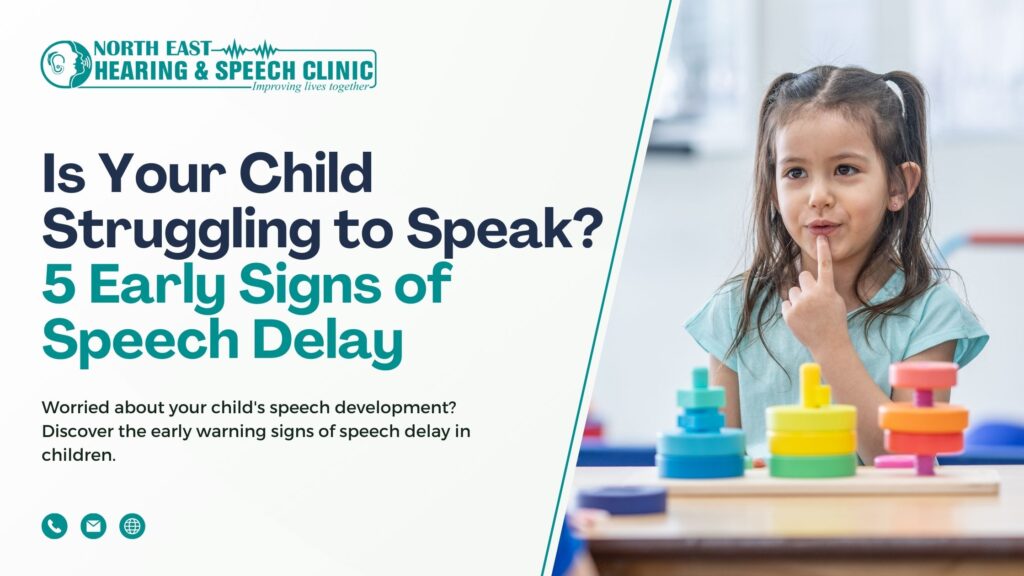As a parent, watching your child grow and develop is an incredibly rewarding experience. One of the most significant milestones in a child’s life is the development of speech. While it’s normal for children to progress at their own pace, there are certain signs that may indicate a potential speech delay. Early identification of speech challenges is crucial as it allows for timely intervention and support.
In this article, I’ll discuss five key signs to watch for that might suggest your child could benefit from speech therapy.
Sign 1: Delayed Babbling or Lack of Vocalization
Babbling is a baby’s first step towards language development. It’s a joyful sound that marks the beginning of their communication journey. Typically, babies start babbling around six months of age. They experiment with different sounds, syllables, and tones. It’s their way of practicing the building blocks of speech.
If your baby isn’t making these sounds by around nine months, it might be a sign of a potential speech delay. Remember, every child is unique, but a consistent lack of vocalization should be observed closely.
Sign 2: Limited Vocabulary
A child’s vocabulary grows rapidly during their early years. They start by understanding and using single words and gradually move on to combining words to form short sentences. While the rate of vocabulary growth varies, there’s a general timeline to follow.
If your child seems to have a significantly smaller vocabulary compared to their peers, it could be a sign of a potential speech delay. For example, if your 18-month-old isn’t using at least 10-20 words, it might be worth discussing with a speech-language pathologist.
Sign 3: Difficulty Articulating Sounds
As children grow, they refine their ability to produce different sounds. Initially, it’s common for them to mispronounce words. However, if your child consistently struggles to produce certain sounds or substitutes sounds, it might indicate a difficulty with articulation.
It’s important to differentiate between normal speech sound errors and an actual articulation disorder. While it’s natural for children to simplify words, persistent problems can impact their communication and self-confidence.
Sign 4: Challenges with Understanding Language
Understanding language is as important as producing it. Receptive language refers to a child’s ability to comprehend what others say. It’s the foundation for building vocabulary, grammar, and social skills.
If your child consistently seems to miss the point of conversations, struggles to follow simple instructions, or has difficulty understanding stories, it could indicate challenges with receptive language. Remember, every child develops at their own pace, but persistent difficulties can impact their overall communication and development.
Sign 5: Social Communication Difficulties
Effective communication involves more than just speaking clearly. Social communication skills are equally important. This includes understanding and responding to social cues, engaging in conversations, and building relationships.
If your child struggles to initiate or maintain conversations, has difficulty understanding body language or facial expressions, or seems to have trouble taking turns in a conversation, it might indicate potential social communication challenges. These skills are essential for success in school and social interactions.
Conclusion
Identifying potential speech delays early on is crucial for your child’s development. While it’s normal for children to progress at different rates, paying attention to these five signs can provide valuable insights. Remember, every child is unique, and this information is intended to be a general guide.
If you suspect your child might be experiencing speech delays, it’s essential to seek professional guidance. Early intervention is key to helping your child reach their full potential. Call us at 07002400191 or click here to schedule a consultation today to assess your child’s speech development and discuss appropriate next steps. Remember, you’re not alone on this journey. We’re here to support you and your child.
FAQ: Does My Child Need Speech Therapy?
What is considered a speech delay?
A speech delay occurs when a child’s speech development is significantly behind their peers. It’s important to note that every child develops at their own pace, but if you notice consistent delays in babbling, vocabulary growth, or articulation, it’s worth seeking professional evaluation.
At what age should I be concerned about my child’s speech?
While there are general milestones, it’s essential to observe your child’s individual development. If you have concerns about your child’s speech at any age, it’s never too early to seek guidance from a speech-language pathologist. Early intervention is key.
Can I help my child improve their speech at home?
Absolutely! Parents play a crucial role in a child’s speech development. Engaging in interactive play, reading aloud, and speaking clearly can significantly contribute to language growth. However, professional guidance can provide specific strategies tailored to your child’s needs.
What are the long-term effects of untreated speech delay?
Untreated speech delay can impact a child’s social, emotional, and academic development. Early intervention can help prevent these challenges and improve overall well-being.
How long does speech therapy typically take?
The duration of speech therapy varies depending on the severity of the delay and the child’s progress. Regular therapy sessions, combined with home practice, can lead to significant improvements over time.
Can speech delay be prevented?
While there’s no guaranteed way to prevent speech delay, providing a stimulating language environment, engaging in regular conversations, and seeking early intervention for any hearing issues can contribute to healthy speech development.

